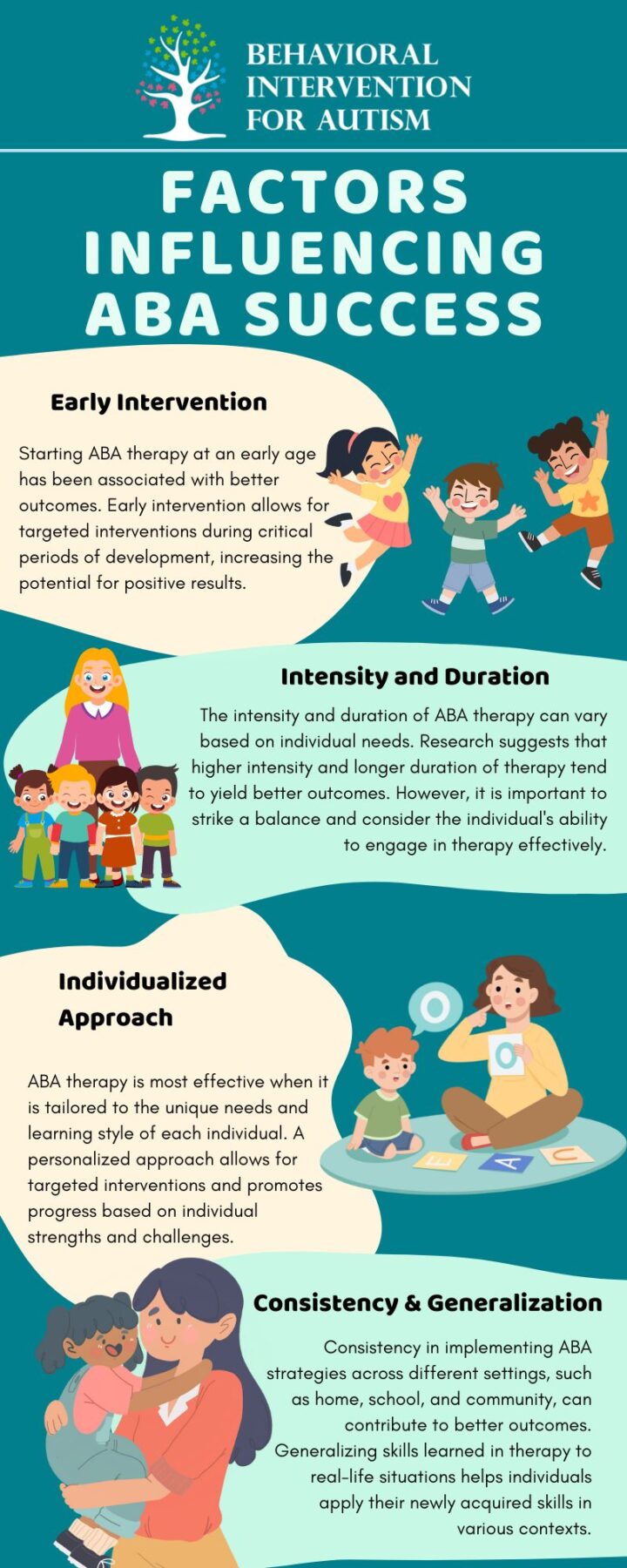Why ABA Therapy is proven for skill development
Understanding the Impact of Behavioral Therapy on Mental Health
Behavioral treatment plays an important role in improving psychological health and health. It uses structured techniques to determine and change unfavorable behaviors and assumed patterns. By fostering self-awareness and psychological durability, people can create healthier coping approaches. The nuances of its effectiveness throughout various psychological health and wellness concerns and its integration right into daily life remain complicated. Checking out these elements discloses the profound influence Behavioral Therapy can have on overall top quality of life.
The Concepts of Behavioral Therapy
Behavioral Treatment is grounded in the principles of learning theory, stressing the duty of observable behavior in psychological wellness therapy. This strategy is based on the property that actions are discovered and can be unlearned or customized via proper treatments. It concentrates on the communication in between sensations, actions, and ideas, presuming that changing maladaptive behaviors can cause enhanced mental and psychological well-being.
Central to this treatment is the principle of support, where positive or adverse stimuli influence actions modification. Furthermore, Behavior Treatment prioritizes quantifiable end results, aiming to track progress with evident modifications. It also identifies the significance of context, advocating for an understanding of environmental elements that add to behavior patterns. By applying these concepts, Behavioral Therapy addresses a variety of mental health problems, making it a effective and flexible treatment alternative for individuals looking for to enhance their mental health and wellness through structured behavior alterations.
Typical Methods Used in Behavioral Treatment
Common methods made use of in Behavioral Treatment play a crucial duty in resolving numerous mental wellness issues. This discussion will highlight cognitive behavior strategies, direct exposure therapy techniques, and support methods, each adding distinctively to the therapeutic process. Understanding these strategies can boost awareness of exactly how Behavioral Treatment successfully advertises mental wellness.
Cognitive Behavioral Techniques
While different methods exist within the domain of treatment, cognitive behavioral techniques stand out for their structured techniques aimed at resolving unfavorable thought patterns and behaviors. These techniques normally entail identifying distorted cognitions, testing these ideas, and changing them with more balanced viewpoints. Usual approaches consist of cognitive restructuring, where people find out to identify and customize their automatic negative ideas, and behavior activation, which urges engagement in positive tasks to combat feelings of depression. In addition, mindfulness techniques are commonly integrated to enhance recognition of thoughts and feelings without judgment. By systematically working via these methods, people can create much healthier coping systems, ultimately bring about enhanced mental wellness and durability versus different emotional obstacles.
Exposure Treatment Techniques
Direct exposure treatment approaches are commonly identified as effective techniques within Behavior Treatment, specifically for treating anxiousness disorders, phobias, and post-traumatic stress disorder (PTSD) These techniques include steady exposure to feared stimuli, allowing individuals to challenge and process their anxieties in a controlled environment. Common techniques include methodical desensitization, where individuals are gradually subjected to anxiety-provoking circumstances while practicing leisure techniques. Another technique is swamping, which immerses individuals in their concerns for a prolonged period, commonly leading to fast desensitization. Online fact direct exposure treatment has actually likewise obtained appeal, allowing individuals to involve with online settings that replicate their fears. On the whole, direct exposure therapy techniques aim to lower avoidance habits and assist people create coping strategies, inevitably enhancing psychological health and well-being.
Support Approaches Clarified
Support approaches play a crucial function in Behavior Treatment, utilizing various methods to urge wanted actions and reduce unwanted ones. Positive reinforcement entails compensating a habits, making it more probable to recur. This can include spoken appreciation, symbols, or concrete benefits. Unfavorable support, on the various other hand, entails eliminating an undesirable stimulation when a wanted habits happens, consequently boosting its regularity. Penalty strategies may likewise be utilized, where an undesirable effect complies with an undesirable habits to minimize its incident. Furthermore, forming techniques gradually strengthen more detailed estimations to the desired habits. By applying these strategies systematically, therapists can successfully modify behavior patterns, promoting psychological wellness and improving general wellness for individuals looking for support in handling their conditions.
Effectiveness of Behavioral Therapy for Numerous Mental Wellness Issues
Behavior Therapy has actually revealed significant effectiveness in treating different psychological health and wellness concerns, especially anxiousness conditions and clinical depression. Research study suggests that individuals going through Behavioral Therapy typically experience noteworthy renovations in managing their signs. This conversation will check out the specific success rates associated with these therapies for stress and anxiety and depression.
Stress And Anxiety Problems Therapy Effectiveness
Anxiety conditions can greatly harm everyday functioning, research study constantly shows the efficacy of behavioral treatment in reducing signs and symptoms. Different forms of Behavior Treatment, including cognitive-behavioral treatment (CBT), have actually revealed substantial success in treating anxiety disorders such as generalized stress and anxiety condition, social stress and anxiety condition, and panic condition. These therapies concentrate on determining and customizing adverse thought patterns and habits, outfitting people with coping techniques to manage their stress and anxiety. Research studies suggest that clients frequently experience a reduction in anxiety levels, enhanced coping mechanisms, and enhanced general lifestyle following therapy. Furthermore, the structured nature of Behavioral Therapy enables measurable progress, making it a recommended option amongst mental health specialists for attending to anxiety-related concerns efficiently.
Clinical Depression Administration Success Fees
Stress and anxiety conditions and depression often co-occur, resulting in overlapping treatment strategies, particularly in the domain name of Behavioral Treatment. Research suggests that cognitive-behavioral therapy (CBT), a prominent kind of Behavioral Treatment, has demonstrated considerable success in taking care of clinical depression. Research studies reveal that around 60-70% of individuals obtaining CBT for clinical depression experience a notable reduction in signs. This efficiency is connected to CBT's structured technique, which go to this web-site furnishes people with coping devices and cognitive restructuring strategies. Additionally, the combination of Behavior Therapy with pharmacotherapy can improve success rates, using a click here to find out more thorough approach for those fighting with serious anxiety. Generally, Behavior Therapy remains a pivotal intervention for improving mental health and wellness end results in people dealing with clinical depression.
The Function of a Therapist in Behavioral Therapy

Specialists act as overviews and facilitators in the method of Behavioral Treatment, assisting customers navigate their obstacles through structured interventions. They use different strategies, such as cognitive restructuring and direct exposure therapy, to help clients in identifying and modifying maladaptive habits and assumed patterns. By developing a supportive and non-judgmental atmosphere, therapists cultivate trust, which is essential for effective healing involvement.
Therapists also educate clients regarding the concepts of Behavioral Therapy, allowing them to comprehend the reasoning behind certain strategies. This understanding equips clients to take an active duty in their therapy. Furthermore, therapists keep an eye on progression, readjusting interventions as required to ensure the very best results. They provide responses and motivation, enhancing favorable changes and assisting clients establish coping techniques for future obstacles. In general, the specialist's function is crucial in leading customers towards improved psychological health and enhanced health via structured healing approaches.

Long-Term Benefits of Behavior Modification
While several individuals seek Behavior Treatment to attend to instant obstacles, the long-lasting benefits extend far past initial sign relief. One substantial advantage is the advancement of coping techniques that enhance emotional resilience, enabling individuals to navigate future tensions better - ABA Therapy. Clients commonly report enhanced self-awareness, which cultivates a better understanding of their behaviors and ideas, assisting in much healthier decision-making procedures
Additionally, Behavior Therapy can result in continual enhancements in interpersonal partnerships. By learning efficient interaction and problem-solving abilities, individuals might experience much deeper connections with others, decreasing feelings of isolation. Lots of find that these restorative strategies add to an aggressive approach to mental health and wellness, allowing them to take care of possible obstacles before they intensify.
Eventually, the long-term influence of Behavior Therapy can lead to a much more fulfilling life, defined by enhanced emotional stability, boosted connections, and a better feeling of general health.
Integrating Behavioral Therapy Into Day-to-day Live
Building on the lasting advantages of Behavioral Treatment, incorporating its principles into everyday life can additionally enhance emotional strength and wellness. Individuals can start by including straightforward strategies, such as cognitive you can try these out restructuring, which entails tough adverse thoughts and replacing them with even more positive alternatives. Developing a regimen that includes mindfulness methods, like meditation or deep breathing, can likewise foster understanding of emotions and habits.
Establishing attainable objectives and celebrating small victories can reinforce self-efficacy and inspiration. Taking part in normal exercise not just improves state of mind yet additionally assists maintain the self-control discovered with therapy. Furthermore, promoting encouraging relationships and open communication can provide important emotional support. By proactively applying these Behavioral Therapy techniques, individuals can grow a much healthier frame of mind, browse daily obstacles better, and add to an overall enhanced top quality of life.
Frequently Asked Concerns

For How Long Does Behavioral Therapy Generally Last?
Behavioral Therapy typically lasts from a few weeks to a number of months, depending upon individual needs and particular issues being dealt with. Sessions typically take place weekly, with progress analyses guiding the period of the therapy.
Can Behavior Modification Be Done Online?
Behavior Treatment can without a doubt be carried out on the internet, making use of video clip conferencing platforms. This method supplies versatility and ease of access, permitting people to engage with their therapists from the convenience of their homes, keeping therapeutic connection.
What Should I Anticipate in My First Session?
In the very first session, clients can expect an introductory conversation, evaluation of their concerns, and establishment of therapy objectives - ABA Therapy. The specialist might clarify the process and resolve any type of inquiries to develop a comfortable environment
Exist Any Negative Effects of Behavior Therapy?
Behavioral Treatment generally has few adverse effects, yet some individuals may experience short-term pain, psychological distress, or raised stress and anxiety as they challenge challenging thoughts and habits. These reactions typically lessen as treatment progresses and coping techniques develop.
Just how Do I Find a Qualified Behavioral Specialist?
To locate a qualified behavior therapist, individuals must look for recommendations from healthcare providers, check on the internet directories, and validate qualifications. In addition, reviewing evaluations and organizing preliminary assessments can aid analyze compatibility and know-how before deciding.
Exposure treatment approaches are widely recognized as effective techniques within behavioral therapy, particularly for treating anxiety problems, anxieties, and post-traumatic anxiety disorder (PTSD) Various types of behavior treatment, including cognitive-behavioral treatment (CBT), have shown significant success in dealing with stress and anxiety conditions such as generalised stress and anxiety disorder, social anxiety condition, and panic problem. Research study indicates that cognitive-behavioral treatment (CBT), a noticeable type of behavioral therapy, has actually demonstrated considerable success in managing anxiety. While many people seek behavior treatment to address immediate challenges, the long-term advantages prolong much beyond preliminary symptom alleviation. Behavioral therapy normally has couple of side effects, but some individuals might experience short-lived pain, psychological distress, or raised stress and anxiety as they challenge challenging thoughts and actions.